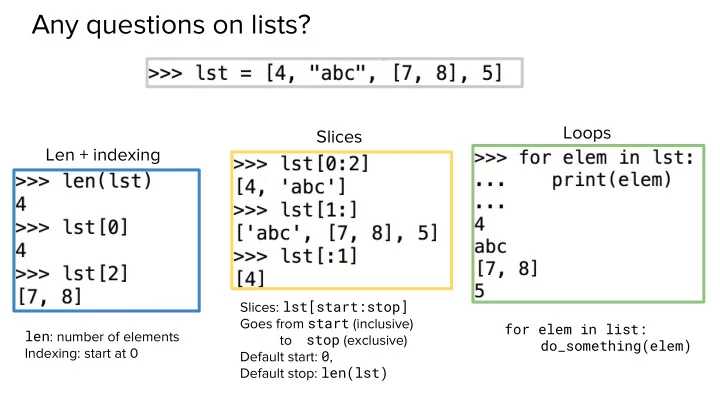

Any questions on lists? Loops Slices Len + indexing Slices: lst[start:stop] Goes from start (inclusive) for elem in list: len : number of elements to stop (exclusive) do_something(elem) Indexing: start at 0 Default start: 0 , Default stop: len(lst)
Discussion 4: Data Abstraction & Sequences Caroline Lemieux (clemieux@berkeley.edu) February 21st, 2018
Administrativa Homeworks HW 3 due today (2/21) Projects Maps Project released and due Thursday 2/28 Optional Hog strategy contest ends Friday 2/22. Hog composition scores on OK Other Caroline’s website on the cs61a website! Easy links!
List Comprehensions
[map-expr for name in iter-expr if filter-expr] (Optional) Map: Applies Input: an Output: Filter : get rid of map existing elements that a new expression to don’t fulfill list list each element condition [x*x for x in [1, 2, 3, 4, 5] if x % 2 == 1] Squares Keeps elements each [1, 2, 3, 4, 5] [1, 9, 25] where x % 2 == 1 [1, 3, 5] element
Data Abstraction
Car abstraction abstraction barrier What the car manufacturer sees: What the end-user sees/uses:
Discussion Section ADT abstraction barrier The implementation: What the end-user sees/uses: Constructor: make_discussion Selectors: get_ta get_time get_students Note: the body (implementation of these functions) is hidden!
Worksheet time
Attendance links.cs61a.org/caro-disc
Recursion on Lists
Let’s go through a familiar problem... Write make_zipper , which, given a list of functions [f1, f2, f3] returns a function like lambda x: f1(f2(f3(x))) E.g. make_zipper([square, double]) → lambda x: square(double(x)) >>> make_zipper([]) lambda x: x >>> make_zipper([f1]) lambda x: f1(x)
Let’s go through a familiar problem... Write make_zipper , which, given a list of functions [f1, f2, f3] returns a function like lambda x: f1(f2(f3(x))) E.g. make_zipper([square, double]) → lambda x: square(double(x)) >>> make_zipper([]) lambda x: x >>> make_zipper([f1]) How can we fit lambda x : x here? lambda x: f1(x)
Let’s go through a familiar problem... Write make_zipper , which, given a list of functions [f1, f2, f3] returns a function like lambda x: f1(f2(f3(x))) E.g. make_zipper([square, double]) → lambda x: square(double(x)) >>> make_zipper([]) lambda x: x >>> make_zipper([f1]) How can we fit lambda x : x here? lambda x: f1(x) These are the same! lambda x: f1((lambda x : x)(x))
Skeleton... def make_zipper (fn_lst): if lst == []: return _________________ else: first_fn = _________________ rest_of_fns = _________________ return _________________
Answer def make_zipper (fn_lst): if lst == []: return lambda x : x else: first_fn = lst[0] rest_of_fns = lst[1:] return lambda x: first_fn( make_zipper (rest_of_fns)(x))
General format of list-recursive questions def recurse_on_list (lst): if lst == []: return <base_case_value> else: first = lst[0] rest = lst[1:] return <combine>(first, recurse_on_list (rest)) Typical base case: lst == [] (same as not lst -- why?) Typical recursive case: Use the first element lst[0] , recurse on the rest of the list lst[1:]
Recommend
More recommend